Abstract
OBJECTIVE--To describe the proportion of patients who were discharged from hospital after witnessed cardiac arrest outside hospital in relation to whether a bystander initiated cardiopulmonary resuscitation. PATIENTS--All patients with witnessed cardiac arrest outside hospital before arrival of the ambulance and in whom cardiopulmonary resuscitation was attempted by the emergency medical service in Gothenburg during 1980-92. RESULTS--Cardiopulmonary resuscitation was initiated by a bystander in 18% (303) of 1,660 cases. In this group 69% had ventricular fibrillation at first recording compared with 51% in the remaining patients (P < 0.001). Among patients in whom cardiopulmonary resuscitation had been initiated by a bystander 25% were discharged alive versus 8% of the remaining patients (P < 0.001). Independent predictors of survival were in order of significance: initial arrhythmia (P < 0.001), interval between collapse and arrival of first ambulance (P < 0.001), cardiopulmonary resuscitation initiated by a bystander (P < 0.001), and age (P < 0.01). Among patients who were admitted to hospital alive 30% of patients in whom cardiopulmonary resuscitation had been initiated by a bystander compared with 58% of remaining patients (P < 0.001) had brain damage and died in hospital. Corresponding figures for death in association with myocardial damage were 18% and 29% respectively (P < 0.01). CONCLUSIONS--Cardiopulmonary resuscitation initiated by a bystander maintains ventricular fibrillation and triples the chance of surviving a cardiac arrest outside hospital. Furthermore, it seems to protect against death in association with brain damage as well as with myocardial damage.
Full text
PDF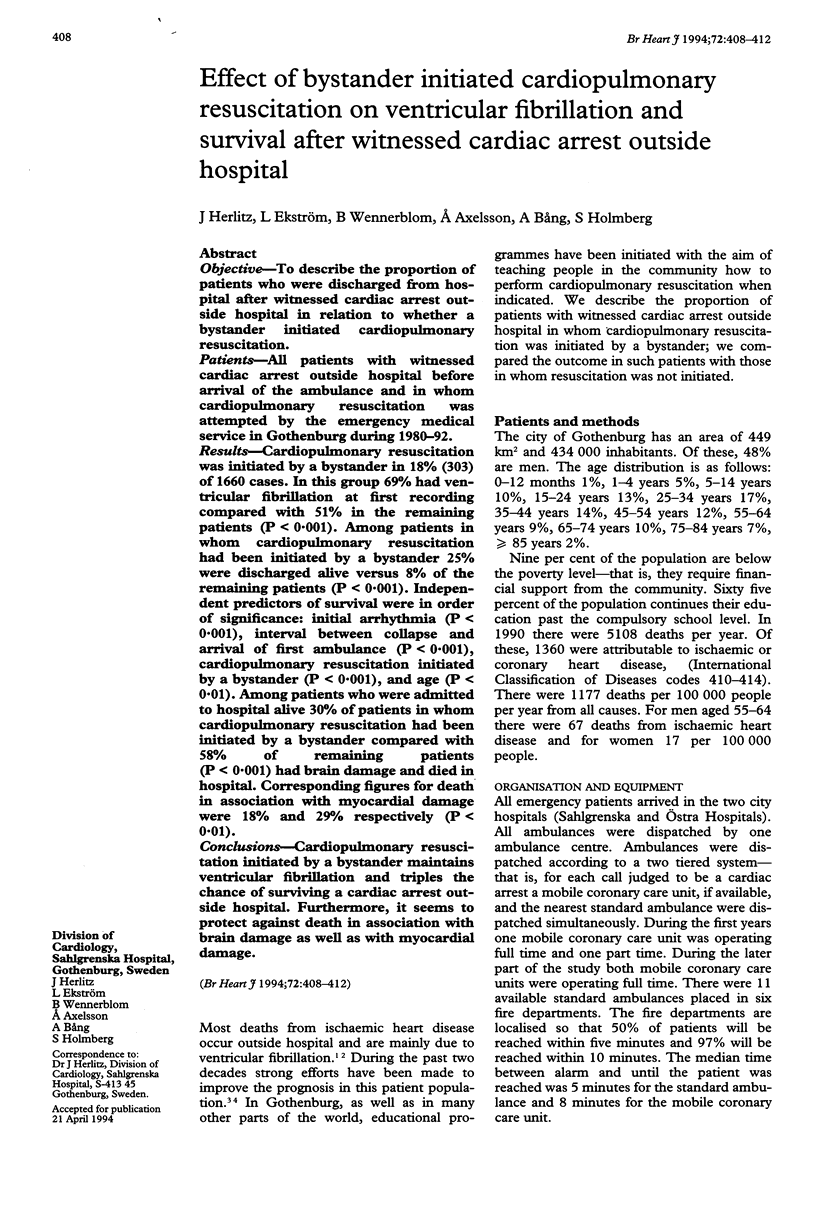
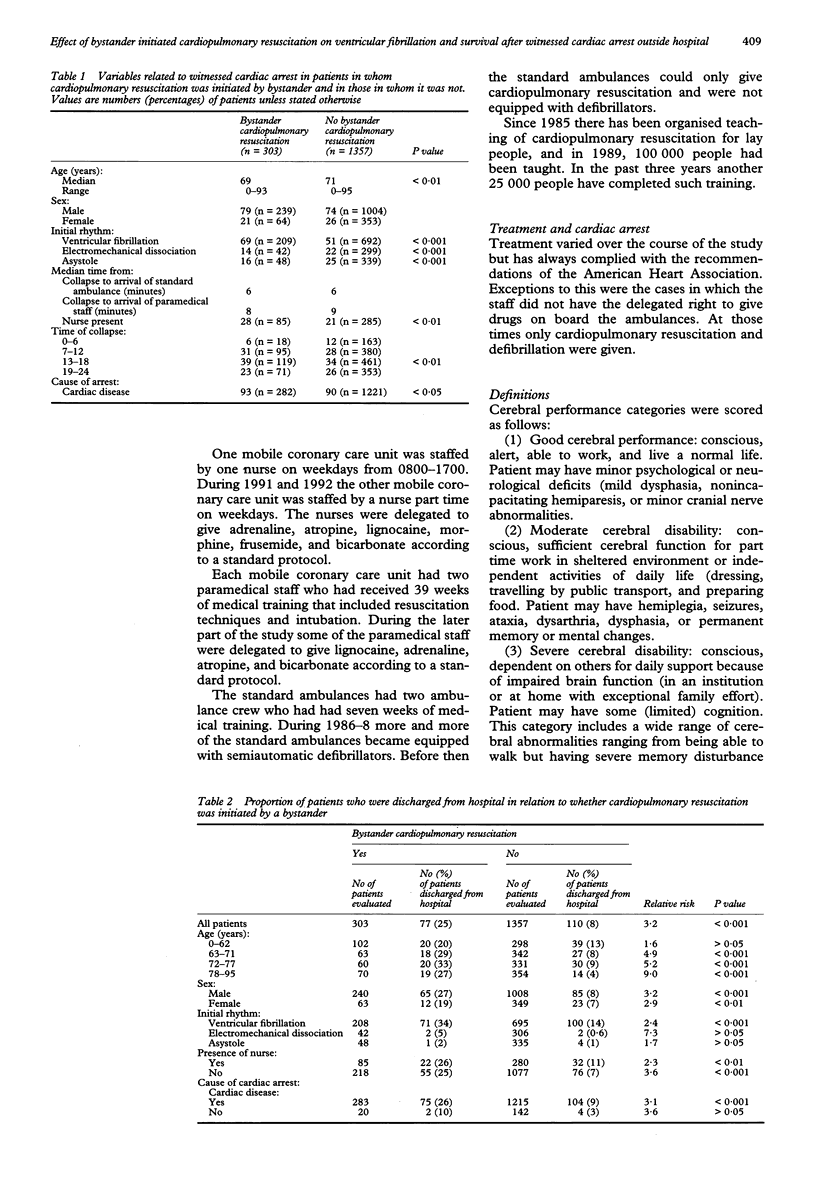
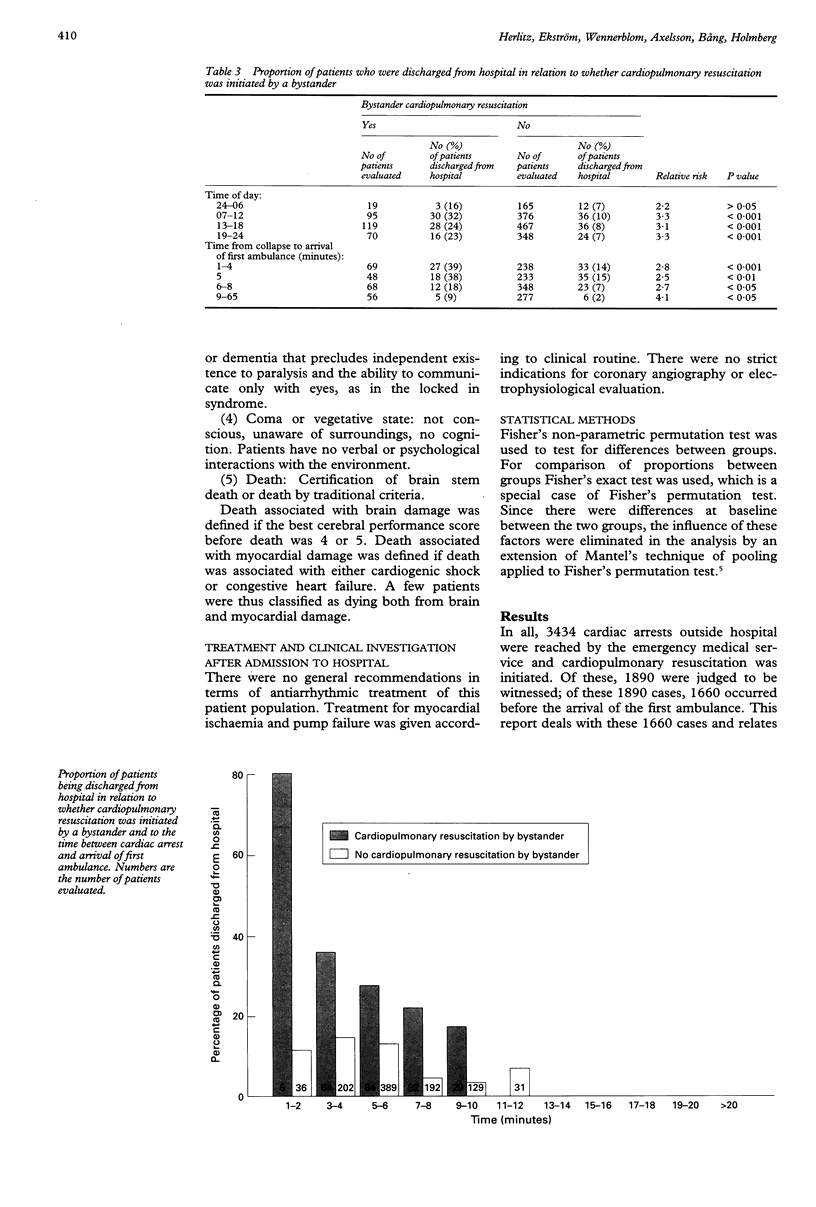
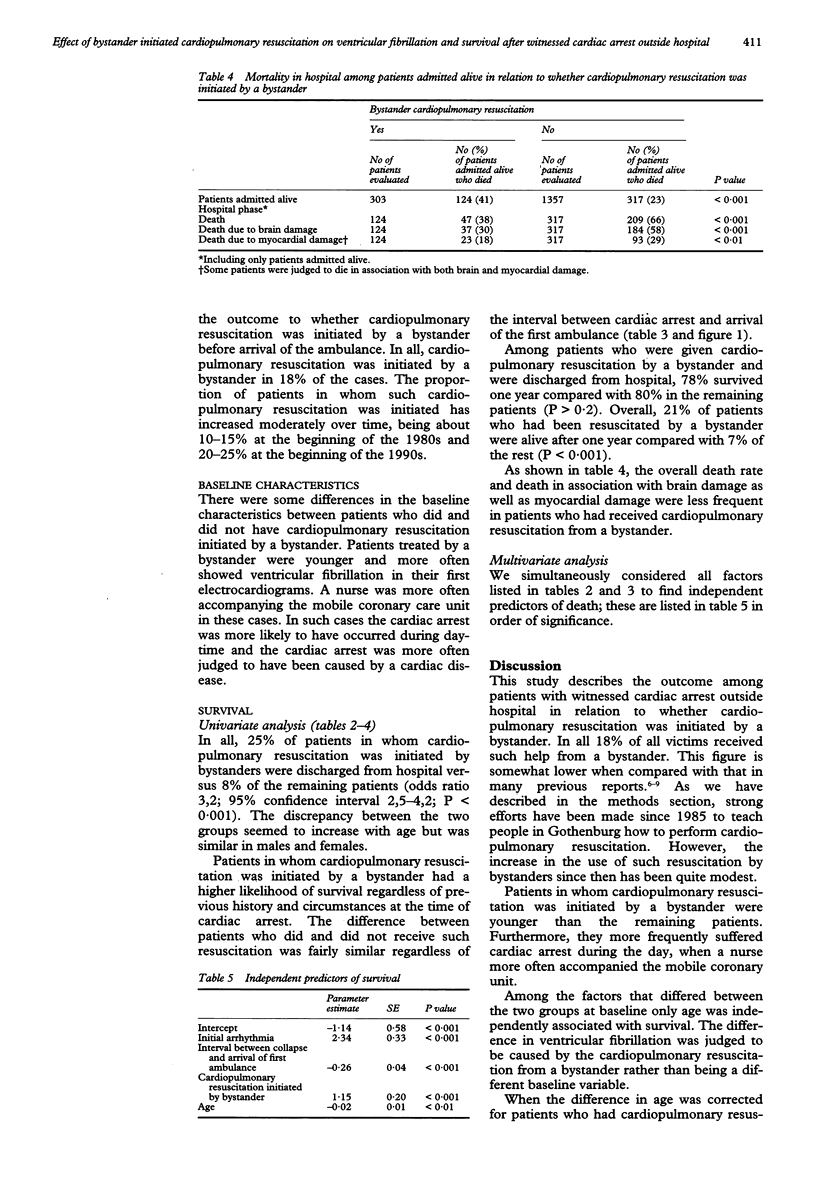
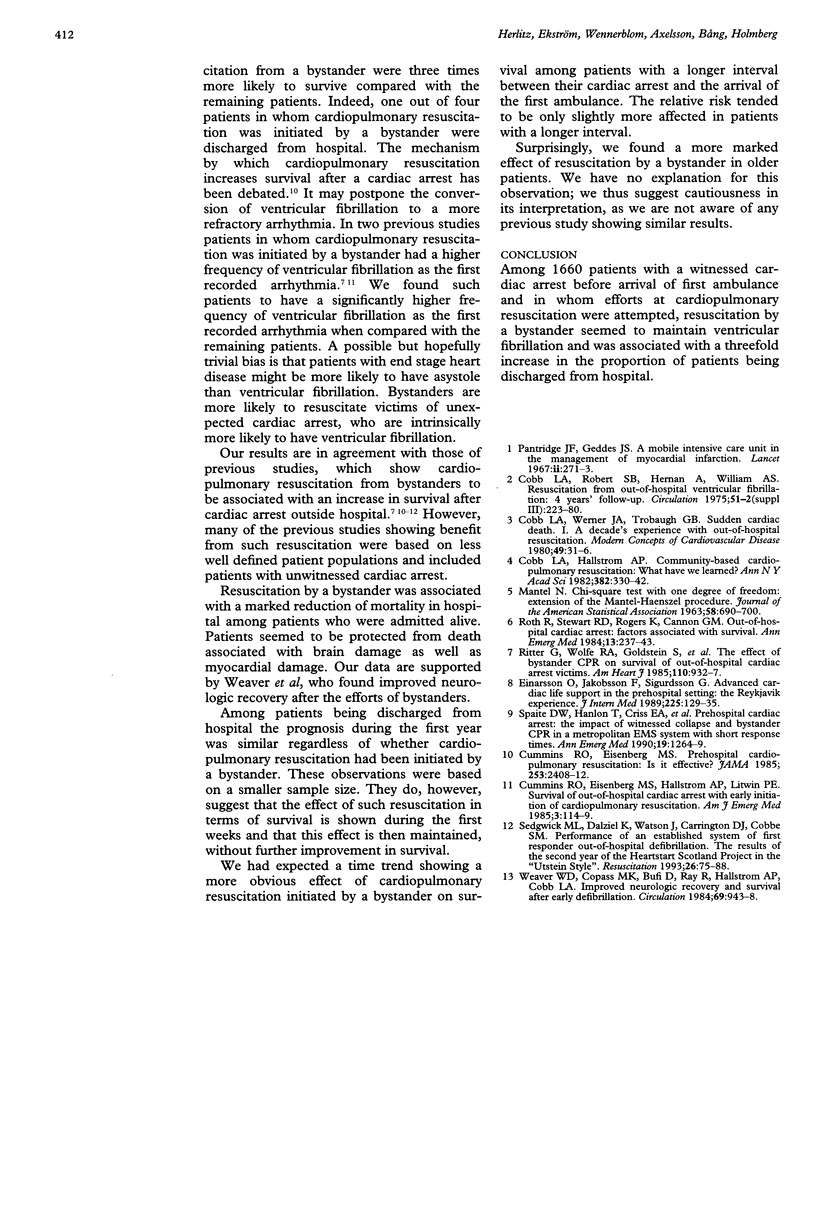
Selected References
These references are in PubMed. This may not be the complete list of references from this article.
- Cobb L. A., Hallstrom A. P. Community-based cardiopulmonary resuscitation: what have we learned? Ann N Y Acad Sci. 1982;382:330–342. doi: 10.1111/j.1749-6632.1982.tb55228.x. [DOI] [PubMed] [Google Scholar]
- Cobb L. A., Werner J. A., Trobaugh G. B. Sudden cardiac death. I. A decade's experience with out-of-hospital resuscitation. Mod Concepts Cardiovasc Dis. 1980 Jun;49(6):31–36. [PubMed] [Google Scholar]
- Cummins R. O., Eisenberg M. S., Hallstrom A. P., Litwin P. E. Survival of out-of-hospital cardiac arrest with early initiation of cardiopulmonary resuscitation. Am J Emerg Med. 1985 Mar;3(2):114–119. doi: 10.1016/0735-6757(85)90032-4. [DOI] [PubMed] [Google Scholar]
- Cummins R. O., Eisenberg M. S. Prehospital cardiopulmonary resuscitation. Is it effective? JAMA. 1985 Apr 26;253(16):2408–2412. [PubMed] [Google Scholar]
- Einarsson O., Jakobsson F., Sigurdsson G. Advanced cardiac life support in the prehospital setting: the Reykjavik experience. J Intern Med. 1989 Feb;225(2):129–135. doi: 10.1111/j.1365-2796.1989.tb00052.x. [DOI] [PubMed] [Google Scholar]
- Pantridge J. F., Geddes J. S. A mobile intensive-care unit in the management of myocardial infarction. Lancet. 1967 Aug 5;2(7510):271–273. doi: 10.1016/s0140-6736(67)90110-9. [DOI] [PubMed] [Google Scholar]
- Ritter G., Wolfe R. A., Goldstein S., Landis J. R., Vasu C. M., Acheson A., Leighton R., Medendrop S. V. The effect of bystander CPR on survival of out-of-hospital cardiac arrest victims. Am Heart J. 1985 Nov;110(5):932–937. doi: 10.1016/0002-8703(85)90187-5. [DOI] [PubMed] [Google Scholar]
- Roth R., Stewart R. D., Rogers K., Cannon G. M. Out-of-hospital cardiac arrest: factors associated with survival. Ann Emerg Med. 1984 Apr;13(4):237–243. doi: 10.1016/s0196-0644(84)80470-9. [DOI] [PubMed] [Google Scholar]
- Sedgwick M. L., Dalziel K., Watson J., Carrington D. J., Cobbe S. M. Performance of an established system of first responder out-of-hospital defibrillation. The results of the second year of the Heartstart Scotland Project in the 'Utstein Style'. Resuscitation. 1993 Aug;26(1):75–88. doi: 10.1016/0300-9572(93)90166-n. [DOI] [PubMed] [Google Scholar]
- Spaite D. W., Hanlon T., Criss E. A., Valenzuela T. D., Wright A. L., Keeley K. T., Meislin H. W. Prehospital cardiac arrest: the impact of witnessed collapse and bystander CPR in a metropolitan EMS system with short response times. Ann Emerg Med. 1990 Nov;19(11):1264–1269. doi: 10.1016/s0196-0644(05)82285-1. [DOI] [PubMed] [Google Scholar]
- Weaver W. D., Copass M. K., Bufi D., Ray R., Hallstrom A. P., Cobb L. A. Improved neurologic recovery and survival after early defibrillation. Circulation. 1984 May;69(5):943–948. doi: 10.1161/01.cir.69.5.943. [DOI] [PubMed] [Google Scholar]


